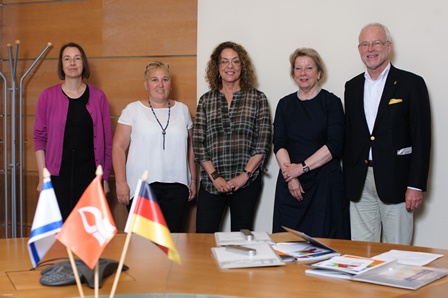BGU President
Prof. Rivka Carmi and Universität der Bundeswehr (UniBw) München President Prof.Merith Niehuss (pictured above) signed a Memorandum of Understanding last week
laying the groundwork for future collaborations in fields ranging from civil
engineering to cyber security. The German Armed Forces University has a number
of similar areas of research and is seeking to expand some of its research
capabilities.
UniBw has a student body of 3,000, 90% of whom
are some of the top soldiers in the German Armed Forces. They must sign up for
13 years and when they are discharged and enter the civilian labor market they
have military training and advanced degrees.
UniBw has a number of research centers that
correspond to BGU’s research strengths and therefore they sought out BGU’s
assistance to expand.
Risk, Infrastructure, Security and Conflict
Center – Prof. Niehuss was accompanied by Prof. Dr.
Norbert Gebbeken, Civil Engineering Department, who has consulted on the
protection of the Israeli Consulate in Munich and the new German Embassy in Tel
Aviv, among many other projects.
BGU’s Prof. David Ornai of the Structural
Engineering Department is currently a visiting researcher at UniBw,
strengthening the research collaboration even before the MoU was signed.
At UniBw’s Modern Vehicles Center, they
focus on driving assistance systems and off road autonomous vehicles. BGU’s
Prof. Hugo Guterman is one of Israel’s foremost experts in autonomous robotics
researching autonomy in the air, on land, and in the sea.
The Galileo satellite was invented at UniBw
in their Munich Integrated Research on Aerospace. BGU is currently building up
its aerospace capabilities and recently successfully launched a nanosatellite
called BGUSAT in conjunction with Israel Aerospace Industries (IAI) and the
Israel Space Agency.
UniBw is also interested in Smart Health,
as is BGU.
Finally, UniBw is set to make a big push to
increase their cyber defense research capabilities. They will build a 250
million Euro cyber security building, which will make them the biggest center
in Germany. They are set to add 15 new professorships and 80-90 jobs in the
field. Moreover, the German Ministry of Internal Affairs will be sending 400
cyber security experts to research and train at UniBw.
BGU is at the heart of turning Beer-Sheva
into the cyber capital of Israel and a major international hub. BGU has many researchers from a variety of departments focusing on cyber security and has longstanding partnerships with
major multinational corporations such as Deutsche Telekom, Dell-EMC, Leidos and
IBM. The IDF’s technology units are set to move to Beer-Sheva in the next five
years and BGU is doubling the size of its Beer-Sheva campus to accommodate an
expected 5,000 more students from the IDF. Israel’s National CERT has moved
into the Advanced Technologies Park adjacent to the University. The Park is a
BGU initiative to retain and increase the number of hi-tech jobs in the South.
BGU’s Vice Rector for International
Academic Affairs Prof. Limor Aharonson-Daniel and Dr. Alexandra Bettag,
Director International Office, UniBw also took part in the meeting.
